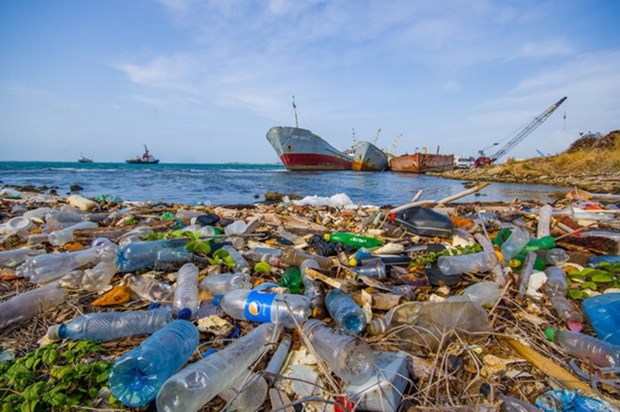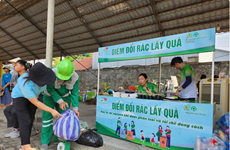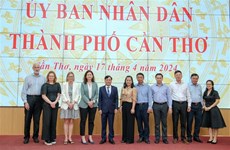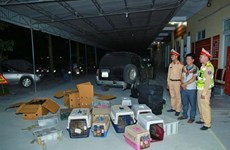HCM City deals with high volume of plastic waste due to COVID-19
The environmental sector of Ho Chi Minh City has taken various solutions to intensify the management of plastic waste that piles up amid the COVID-19 pandemic.
 COVID-19 has sparked online shopping in HCM City during the fourth wave of COVID-19 infections, leading to the accumulation of plastic waste. (Photo: VNA)
COVID-19 has sparked online shopping in HCM City during the fourth wave of COVID-19 infections, leading to the accumulation of plastic waste. (Photo: VNA)The pandemic has sparked online shopping in the southern largest economic hub during the fourth wave of COVID-19 infections, leading to the accumulation of plastic waste.
Due to the disrupted production of eco-friendly packaging materials, local residents and business establishments have to replace them by plastic bags and bottles, and other single-use products.
Moreover, thanks to their convenience and low cost, plastic products have dominated shops and restaurants in the city over the past time.
According to Nguyen Thi Que Lam, from HCM City Urban Environment Co., Ltd. (CITENCO), although the volume of daily waste has reduced over the past time, plastic waste has been on the rise.
From October 2021, CITENCO has resumed the collection and recycling of plastic waste, she said, adding that it has also joined hands with the Packaging Recycling Organisation Vietnam to buy solid waste from private garbage collectors for recycling.
Many localities in HCM City have also stepped up the communication work to raise public awareness of plastic waste sorting, collection, recycling and treatment.
Tan Phu district is an example, which has delivered leaflets guiding local residents how to classify garbage and presented trash bins to them. The district will continue with waste sorting models and the exchange of recyclable waste for gifts.
The municipal Department of Natural Resources and Environment emphasised the target of minimising, towards saying no to non-degradable plastic bags and single-use plastic utensils at State agencies, schools, medical facilities and households in the city.
To that end, HCM City will review and evaluate sources of plastic waste, and then propose suitable, effective solutions in the management work, while encouraging supermarkets, commercial centres, convenience stores and markets to join the efforts.
Specifically, the supermarkets, commercial centres, convenience stores and bookshops should offer discounts to customers who come with eco-friendly bags.
Many businesses in HCM City have responded to the local authorities’ call in the fight against plastic waste.
Phan Thi Thuy Phuong, Director of the Phuong Lan Environmental Friendly Packing Import Export Trading Production Company Limited, said each month her company sells about 100 tonnes of eco-friendly products.
Vietnam uses about 104,000 single-use plastic bags per day, or 38 million plastic bags a year. Up to 46 out of 48 supermarkets are providing plastic bags free of charge, and each supermarket consumes about 1,454 plastic bags a day on average, statistics showed.
The country aims to use 100 percent of environmentally-friendly plastic bags and packaging at shopping malls and supermarkets by 2025, according to a project on strengthening the management of plastic waste in Vietnam approved by Deputy Prime Minister Le Van Thanh last year.
Other goals are to collect, reuse, recycle and treat 85 percent of plastic waste; to reduce the volume of plastic waste dumped to oceans by half; to have 100 percent of tourism complexes, hotels and other lodging facilities not use non-biodegradable plastic bags and single-use plastic products by 2025.
Additionally, the project will gradually cut the production and consumption of non-biodegradable plastic bags and single-use plastic products in daily life; while raising awareness among organisations, enterprises and the community about the harmful effects of single-use plastic items to the environment, ecosystem and human health, and encouraging consumers to shift away from single-use and non-biodegradable plastics to eco-friendly alternatives.
It will campaign producers and distributors of single-use and non-biodegradable plastic products to shift to eco-friendly equivalents and promote the development and application of advanced technology in plastic waste management and manufacturing of environmentally-friendly products.
The project will also build a network of local communicators who are tasked to instruct people in how to properly classify, reuse and treat plastic waste and waste at large; and integrate knowledge about single-use and non-biodegradable plastics into school curriculums at all levels./.













